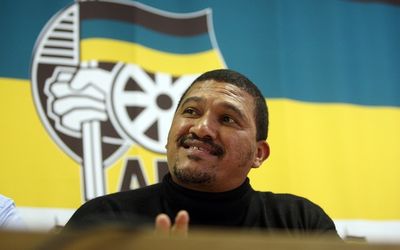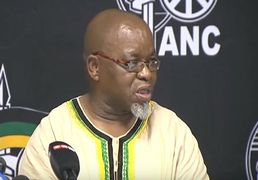THE provincial elections in the fiercely contested Western Cape are barely over but the two main parties — the Democratic Alliance (DA) and the African National Congress (ANC) — are already preparing their battle plans for the local government elections in 2016.
With about 98.5% of the total votes counted, the DA has taken 59.5% of the provincial vote, up from 51% in 2011 and the ANC has obtained 32.8% compared with 32.9% in 2009.
The ANC’s "path to power" strategy will be led by provincial leader Marius Fransman, who will no longer be serving in government where he has held the position of international relations and co-operation deputy minister.
He will be leading the opposition in the provincial legislature and driving the party’s campaign to reconnect with communities and build a unified and coherent organisation, the party said.
Mr Fransman told the media at the provincial operations centre of the Electoral Commission of South Africa in Cape Town on Friday that the ANC had decided he needed to be in the province, driving the ANC’s strategy on the ground.
Bitter infighting and organisational collapse in the past contributed to the decline of ANC support in the Western Cape, something which the ANC wanted to fix, Mr Fransman said.
Both the DA and the ANC are claiming increased support in rural areas, with DA provincial leader Ivan Meyer insisting that his party had increased its support in former ANC strongholds such as Saldanha Bay and Beaufort West, as well as in Prince Albert, Oudtshoorn and Agulhas.
"We have grown in all communities in the Western Cape," he told the media.
Mr Meyer said the DA was committed to delivering "clean, accountable and efficient" government in the province as the election had shown that this was the only way to win votes.
Mr Fransman was equally insistent that the ANC had won more votes in the Boland, the Hessaqua region, Matzikama and the West Coast.
He believed that the downward spiral of the ANC’s support had been halted and that the ANC’s fortunes had turned around.
The party’s strategy of reconnecting with communities in rural areas and taking up real issues had paid off, Mr Fransman said. The party had also consolidated its support in the black townships of Cape Town.
"On the platteland we are getting back support that we lost in 2009."
This was particularly the case in towns where the ANC had decided not to join coalitions in government but had rather remained as the opposition. Where it had entered into coalitions, it was not solely responsible for the policies adopted but was blamed when things went wrong, he said.
"Our path to power strategy is working," Mr Fransman said.
He conceded that the ANC would have liked to have done better but said it was satisfied with its performance. He also conceded that the DA had held onto its voters in coloured areas on the Cape Flats, but said the ANC had become "relevant" in these areas even though this had not translated into votes.
The ANC planned to be a strong opponent to the DA in the provincial legislature, holding it to account, pushing for pro-poor policies and demanding service delivery in the townships.
"The work starts today for 2016," Mr Fransman said. He said that a more coherent and unified organisation in which branches were actively involved with communities would bring back voters for the ANC.
The ANC would also continue to expose what he said was the DA’s "politics of deception" in which it said one thing and did another.

ANC Western Cape leader Marius Fransman. Picture: THE TIMES
THE provincial elections in the fiercely contested Western Cape are barely over but the two main parties — the Democratic Alliance (DA) and the African National Congress (ANC) — are already preparing their battle plans for the local government elections in 2016.
With about 98.5% of the total votes counted, the DA has taken 59.5% of the provincial vote, up from 51% in 2011 and the ANC has obtained 32.8% compared with 32.9% in 2009.
The ANC’s "path to power" strategy will be led by provincial leader Marius Fransman, who will no longer be serving in government where he has held the position of international relations and co-operation deputy minister.
He will be leading the opposition in the provincial legislature and driving the party’s campaign to reconnect with communities and build a unified and coherent organisation, the party said.
Mr Fransman told the media at the provincial operations centre of the Electoral Commission of South Africa in Cape Town on Friday that the ANC had decided he needed to be in the province, driving the ANC’s strategy on the ground.
Bitter infighting and organisational collapse in the past contributed to the decline of ANC support in the Western Cape, something which the ANC wanted to fix, Mr Fransman said.
Both the DA and the ANC are claiming increased support in rural areas, with DA provincial leader Ivan Meyer insisting that his party had increased its support in former ANC strongholds such as Saldanha Bay and Beaufort West, as well as in Prince Albert, Oudtshoorn and Agulhas.
"We have grown in all communities in the Western Cape," he told the media.
Mr Meyer said the DA was committed to delivering "clean, accountable and efficient" government in the province as the election had shown that this was the only way to win votes.
Mr Fransman was equally insistent that the ANC had won more votes in the Boland, the Hessaqua region, Matzikama and the West Coast.
He believed that the downward spiral of the ANC’s support had been halted and that the ANC’s fortunes had turned around.
The party’s strategy of reconnecting with communities in rural areas and taking up real issues had paid off, Mr Fransman said. The party had also consolidated its support in the black townships of Cape Town.
"On the platteland we are getting back support that we lost in 2009."
This was particularly the case in towns where the ANC had decided not to join coalitions in government but had rather remained as the opposition. Where it had entered into coalitions, it was not solely responsible for the policies adopted but was blamed when things went wrong, he said.
"Our path to power strategy is working," Mr Fransman said.
He conceded that the ANC would have liked to have done better but said it was satisfied with its performance. He also conceded that the DA had held onto its voters in coloured areas on the Cape Flats, but said the ANC had become "relevant" in these areas even though this had not translated into votes.
The ANC planned to be a strong opponent to the DA in the provincial legislature, holding it to account, pushing for pro-poor policies and demanding service delivery in the townships.
"The work starts today for 2016," Mr Fransman said. He said that a more coherent and unified organisation in which branches were actively involved with communities would bring back voters for the ANC.
The ANC would also continue to expose what he said was the DA’s "politics of deception" in which it said one thing and did another.














 News, views and analysis of South Africa's national and provincial elections
News, views and analysis of South Africa's national and provincial elections














Change: -0.47%
Change: -0.57%
Change: -1.76%
Change: -0.34%
Change: 0.02%
Data supplied by Profile Data
Change: -1.40%
Change: -0.42%
Change: -0.47%
Change: 0.00%
Change: -0.47%
Data supplied by Profile Data
Change: 1.29%
Change: 1.53%
Change: 1.22%
Change: 1.10%
Change: 1.05%
Data supplied by Profile Data
Change: 0.04%
Change: -0.52%
Change: 0.20%
Change: -1.38%
Change: -2.05%
Data supplied by Profile Data